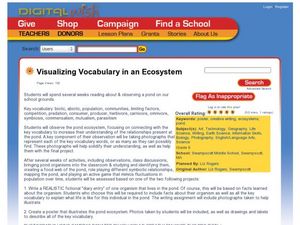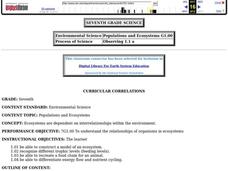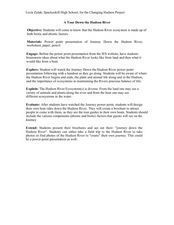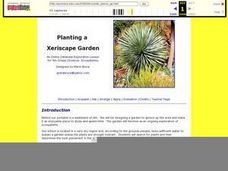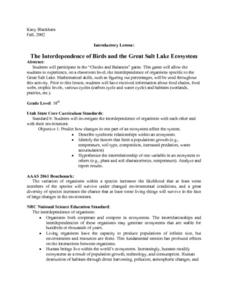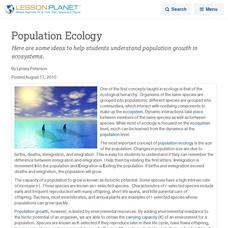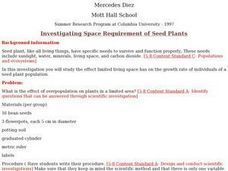Curated OER
Ecosystems II
Students engage in a lesson that is about the concepts related to the careful balance of an ecosystem. They identify the beneficial and harmful relationships that can exist with diverse populations in an ecosystem. The lesson includes...
Curated OER
Visualizing Vocabulary in an Ecosystem
Sixth graders observe the pond ecosystem. In this ecosystem lesson, 6th graders observe the organisms at the pond and create a poster that illustrates the pond.
Curated OER
Relationships Among Living Things
In this living things worksheet, students review terms and concepts about the different relationships between living things. This worksheet has 7 true or false and 5 short answer questions.
Curated OER
Community Distribution
In this community distribution worksheet, students will review 5 terms associated with biomes, ecosystems, and communities. Students will then match 11 terms as either relating to marine biomes or land biomes. This worksheet has 5 fill...
Curated OER
Populations and Ecosystems
Seventh graders create a model of an ecosystem and label it to show structure and function. They research the food web of an aquatic animal and also trace energy flow from the primary producer up the food chain.
Curated OER
Graphing Iron Data
Students apply a data set to create a graph show how iron ore impacts an ecosystem. They explain how the iron effects the distribution and abundance of phytoplankton in coastal ecosystems using spreadsheet software.
Curated OER
A Tour Down the Hudson River
Students discuss how the Hudson River is an ecosystem made up of both biotic and abiotic factors. They view the PowerPoint the Journal Down the Hudson River. Students become aware of where the Hudson River begins and ends, the plant and...
Curated OER
Planting a Xeriscape Garden
Fourth graders use a plant database to discover new vocabulary associated with plants and ecosystems. Using a pile of dirt behind their school, they design a garden to make it a more enjoyable place. They print out the types of plants...
Curated OER
Wild and Wetlands
Upper graders identify the major characteristics of a wetland. They explore the human factors that change a wetland and write a descriptive paragraph about wetlands. This comprehensive lesson also has an interactive "Watershed Game"...
Curated OER
Communities and Biomes
In this communities worksheet, high schoolers will look at the interactions between biotic and abiotic factors and the effect these factors have on organism populations. Students will also order the succession steps that occur over time...
Curated OER
Flowering Phenology: How Do Plants Know When To Flower?
Students explore the biotic and abiotic factors that affect plant reproduction and the potential consequences of human activities on plant populations. The effects of urbanization are discussed as an influence in the consequences.
Curated OER
Climate Change Challenge
Students participate in a demonstration in which they role-play polar bears and habitat components to demonstrate the impacts of climate change on the Arctic Ocean ecosystem.
Science Matters
Oh Heron
Two teams—the environmentalists and herons—play four rounds of the game, Oh Heron. Using hand symbols to represent food, shelter, and water, players locate their match to produce more herons while those unmatched decompose.
Curated OER
Bahamian Terrariums
Sixth graders create a Bahamian terrarium. In this Bahamian ecosystem lesson, 6th graders watch a PowerPoint to see Bahamian biotic and abiotic factors. They bring in 2-3 items for their terrarium.
Curated OER
The Interdependence of Birds and the Great Salt Lake Ecosystem
Tenth graders participate in the "Checks and Balances" game. This game lets them experience the interdependence of oragnisms specific to the Great Salt Lake. They recieved informaton about food chains, food webs, trophic levels various...
Curated OER
Endangered Species
Students watch video clips of endangered animals. They imagine a small garden in front of a house and describe the living and non-living things that could interact to make up a garden eco-system.
Curated OER
Carrying Capacity of Ecosystems
Students define population and carrying. In this algebra lesson, students explore exponential growth and decay based on animals and things that grow or decrease exponentially. They graph their findings and discuss their results as they...
Curated OER
Learning From Leaves: Adaptation Scavenger Hunt
Learners participate in an adaptation scavenger hunt at. They obtain various plant specimens, and sort the plants based on whether they came from a desert, tropical rainforest, or wetlands.
NOAA
Community Ecology and Sampling
Seamounts in the Coral and Tasman Seas are home to more than 850 different species. Groups explore hydrothermal vents, researching the organisms found there and their energy source. They also learn about seamounts, exploring their unique...
Curated OER
Population Ecology
Here are some ideas to help students understand population growth in ecosystems.
Curated OER
Vocabulary: Kansas Prairies
Students explore the ecosystem by reviewing scientific vocabulary terms. In this environmental awareness activity, students identify the differences between abiotic and biotic factors and their relationship to the Earth. Students define...
Curated OER
Understanding Interactions Among Local Species and the Local Environment
Students examine the differences between biotic and abiotic factors, explain the difference between habitat and niche and compare how organisms get their nutritional needs. In this local environment activity students trace the path of...
Curated OER
Investigating Space Requirement of Seed Plants
Students use scientific methods to investigate the effects of overpopulation of seed plants on growth in a limited living space. Students relate seed plant population findings to that of other organisms.
UAF Geophysical Institute
System Interactions: The Lorax and the Truffula Tree
If the Lorax were to write a letter, what would he write? Introduce your class to systems and feedback loops through the whimsical stylings of Dr. Seuss. Learners take on the Lorax's point of view to write a letter, among other activities.



